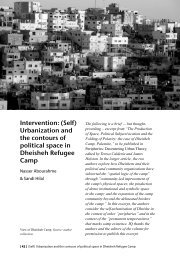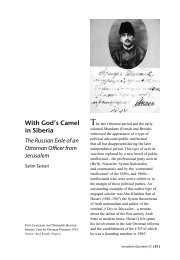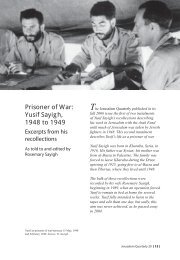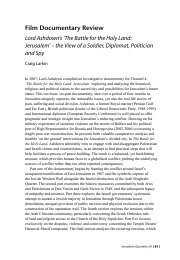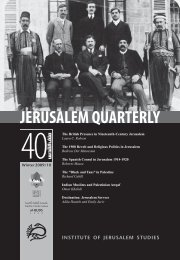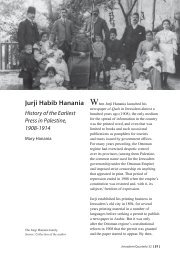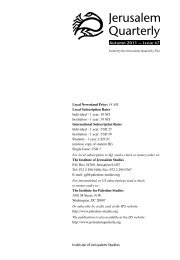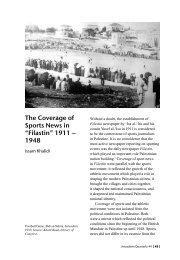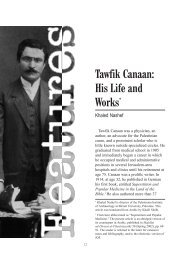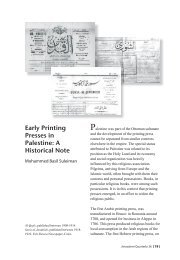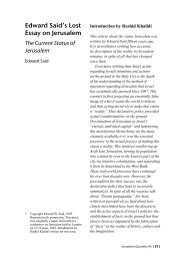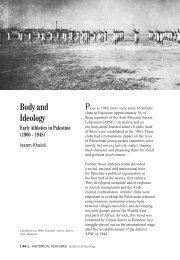PLUNDERING PALESTINE - Jerusalem Quarterly
PLUNDERING PALESTINE - Jerusalem Quarterly
PLUNDERING PALESTINE - Jerusalem Quarterly
Create successful ePaper yourself
Turn your PDF publications into a flip-book with our unique Google optimized e-Paper software.
later resold to Arab schools. Some 450 were handed over in 1954 to the National<br />
Library’s Eastern Studies Department. Around 26,000 books suffered a worse fate:<br />
in 1957, it was decided that they were “unsuitable for use in Arab schools in Israel,<br />
[because] some of them contained inciting materials against the State, and therefore<br />
their distribution or selling might cause damage to the State” 3 . These texts were sold as<br />
paper waste.<br />
This untold story of the fate of Palestinian ‘abandoned’ books clearly demonstrates<br />
how occupation and colonization is not limited to the taking over of physical space.<br />
Rather, it achieves its fulfilment by occupying cultural space as well, and by turning<br />
the cultural artefacts of the victims into ownerless objects with no past. Israel’s<br />
collection of Palestinians’ books marks the transformation of a lively and dynamic<br />
Palestinian culture into museum artefacts. Thus, Palestinian’ books were placed within<br />
the shrine of Israeli libraries, fossilized on the shelves – accessible and at the same<br />
time completely lifeless. 2<br />
Two central issues will be discussed in this essay. First, it will retrace the months<br />
during which the staff of the National Library followed in the wake of the soldiers,<br />
moving from house to house in search of books and intellectual assets that had been<br />
left behind when thousands of Palestinians fled their homes. The second issue to be<br />
discussed is the conflicted handling of these books – their sorting and classification –<br />
in the years to come.<br />
An image guides my investigation, an image that is by no means fictional. Zionist<br />
fighters march along, followed closely by the librarians of the National Library who<br />
are gathering up the books from all the houses of the neighbourhoods of western<br />
<strong>Jerusalem</strong> – Katamon, Musrara, Talbiya, Bakaa, the German Colony. The soldiers take<br />
over the houses, ‘mop up’ the area, eradicate resistance and secure the roads, while<br />
the librarians, some of whom are serving in the standing army and others who are<br />
‘civilians’ (exempt due to their age or because their work was considered essential),<br />
assemble the cultural and intellectual assets. The librarians emerge from a seemingly<br />
marginal role allotted to them by history, to become part of creating the state’s story.<br />
The work of librarians is facilitated by military action – thus, we have the above-cited<br />
letters of gratitude from library officials to the army and the Custodian of Absentee<br />
Property, whose cooperation was crucial.<br />
Simultaneously, and even as the project was underway, I imagine the first seeds of<br />
hesitation, pangs of conscience and misgivings begin to sprout: are the books ours?<br />
What should we do with them?Are we, the employees of the National Library, looting<br />
the books or only keeping them safe temporarily? If we were to return the books to<br />
their rightful owners, how much should we charge for our efforts?<br />
[ 8 ] FEATURES Ownerless Objects?



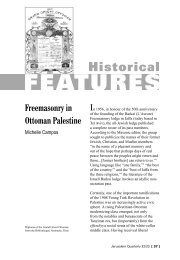
![In Search of Jerusalem Airport [pdf] - Jerusalem Quarterly](https://img.yumpu.com/49007736/1/180x260/in-search-of-jerusalem-airport-pdf-jerusalem-quarterly.jpg?quality=85)
